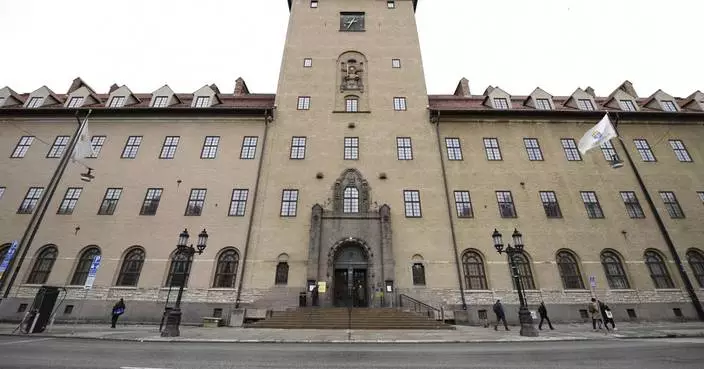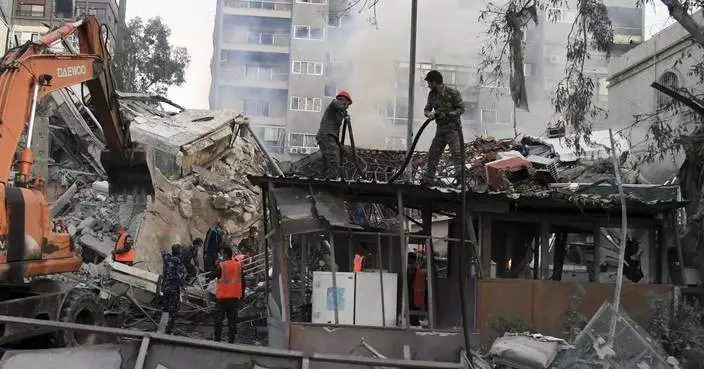Turkish and Russian troops began joint patrols Sunday on a key highway in northwest Syria, Turkey’s Defense Ministry said, while both the Russian government and Syrian opposition activists said the patrols were shortened because of protests.
Patrols on the highway known as the M4, which runs east-west through Idlib province, are part of a cease-fire agreement between Turkey and Russia signed earlier this month. The cease-fire ended an escalation in fighting that saw the Turkish military in rare direct conflict with Syrian government troops.
The vital highway, which runs through northern Syria from the Mediterranean to the Iraqi border, has been partially closed since 2012. Work has been underway over the past days to refurbish it for traffic. Some sections of the M4 remain under rebel control.
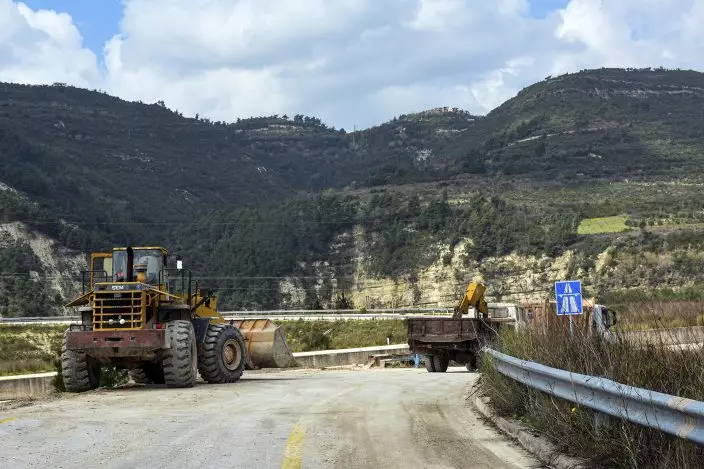
This Tuesday, March. 10, 2020 photo released by the Syrian official news agency SANA, shows workers removing barriers from the road that links Syria’s coastal region with the northern city of Aleppo, in Latakia province, Syria. The reopening of the M4 highway that has been closed since 2012 is part of a deal reached earlier this month between Turkey and Russia that stopped a Russian-backed government offensive on the northwestern province of Idlib, the last rebel stronghold in the country. (SANA via AP)
For the past three days, residents of rebel-held parts of the highway have protested in rejection of Russian troops patrolling the road because of Moscow's strong support to Syrian government forces.
“The first Turkish-Russian united land patrol was carried out on the M4 highway in Idlib with the involvement of land and air elements,” Turkey's Defense Ministry said in a statement.
Russia's Defense Ministry said Turkey and Russia carried out their first joint patrol mission along the M4 highway Sunday adding that “the patrols' route was shortened” after militants used women and children to block the way. The Defense Ministry's statement was carried by state-run news agency Tass.
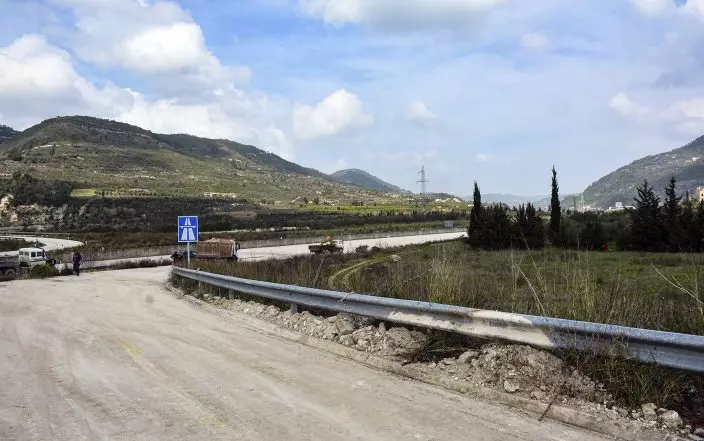
This Tuesday, March. 10, 2020 photo, released by the Syrian official news agency SANA, shows workers removing barriers from the road that links Syria's coastal region with the northern city of Aleppo, in Latakia province, Syria. The reopening of the M4 highway that has been closed since 2012 is part of a deal reached earlier this month between Turkey and Russia that stopped a Russian-backed government offensive on the northwestern province of Idlib, the last rebel stronghold in the country. (SANA via AP)
Ankara has been given additional time to ensure the safety of troops taking part in joint patrols, the Russian Defense Ministry said.
Syrian opposition activists said residents blocked the highway with burning tires near the village of Nairab on the southern edge of Idlib in rejection to patrols by “Russian occupation forces."
The Britain-based Syrian Observatory for Human Rights, an opposition war monitor with activists on the ground in Syria, said the joint patrols were not successful as they moved a short distance west of the government held town of Saraqeb before being stopped by the protests.
It added that jihadi groups have threatened to attack Russian forces on the highway. Idlib is mostly controlled by al-Qaida-linked militants.
Ankara backs some of the opposition groups in Idlib, the fighters' final stronghold against the Russian-backed forces of Syrian President Bashar Assad.
Some 60 Turkish soldiers have been killed in Idlib since the start of February as Syrian troops carried out a ground and air offensive into the province that began in early December. The assault killed hundreds of civilians and sent 1 million fleeing towards the Turkish border.
Russian officials visited Ankara last week to hammer out the cease-fire. After four days of talks, Turkish Defense Minister Hulusi Akar said Turkey hoped the deal would prove to be permanent.
Turkey and Russia already conduct joint military patrols elsewhere in Syria. Following an agreement that halted Turkey’s attack on Kurdish forces in October, soldiers from the two countries monitor an area of northeast Syria along the Turkish border.
BEIRUT (AP) — Amnesty International said Wednesday it has documented widespread abuses, including torture and deprivation of medical care, in detention facilities holding thousands of suspected Islamic State members and their relatives in northeast Syria.
The centers and camps hold about 56,000 people — the majority of them children and teens — and are run by local authorities affiliated with the U.S.-backed, Kurdish-led Syrian Democratic Forces. The SDF and its allies, including U.S.-led coalition forces, defeated the Islamic State group in Syria in 2019, ending its self-proclaimed Islamic “caliphate” that had ruled over a large swath of territory straddling Iraq and Syria.
What to do with the suspected IS fighters and their families has become an intractable issue. Many countries whose citizens traveled to Syria to join IS have been reluctant to repatriate them, as have local communities in Syria.
"People held in this system are facing large-scale violations of their rights, some of which amount to war crimes,” Nicolette Waldman, Amnesty’s senior crisis advisor, told journalists.
The United States is also responsible for the alleged violations because it played a key role in establishing and maintaining the detention system, providing hundreds of millions of dollars to the SDF and affiliated forces and regularly interrogating detainees, Waldman said.
The human rights group interviewed 126 people accused of IS affiliation currently or formerly detained, along with representatives of the local administration and aid workers.
The Amnesty report said the vast majority of detainees are being held “indefinitely, without charge or trial, in violation of international human rights law and international humanitarian law,” while those who have been tried were, in many cases, convicted on the basis of confessions extracted under torture.
The alleged abuses include “beating, stress positions, drowning, electric shocks and gender-based violence,” including a male detainee who said he and others had been sodomized with broomsticks by guards, the report said. Detainees were also deprived of food, water and medical care and subjected to extreme cold and heat in overcrowded cells, with some allegedly dying of suffocation, it said.
The report added that many of the approximately 14,500 women and 30,000 children held had been victims of human trafficking, including women who were forced to marry IS fighters and minors who were forcibly recruited by the group, and that local authorities had failed to set up a “mechanism to identify trafficking victims” and protect them.
The report also criticized the practice of forcibly separating adolescent boys — some as young as 11 or 12 — from their mothers and placing them in rehabilitation centers indefinitely.
Amnesty called on local authorities, the U.S. government and other allies to bring the detention system into compliance with international law and urged the United Nations to work with them to establish a screening process to release all who are not “reasonably suspected” of having committed a serious crime.
The Autonomous Authorities of the North and East Syria Region, the civilian administration affiliated with the SDF, wrote in response to the Amnesty findings that it had not received any official complaints regarding torture in detention facilities and “if this happened, they are individual acts.”
The administration said it would take action against employees who committed violations if evidence is provided. It denied allegations that inmates were deprived of food, water and medical care. It acknowledged overcrowding in the facilities, which it attributed to lack of financial resources to secure larger centers.
The local authorities took issue with the allegation that people were arbitrarily detained, asserting that most detainees “are members of a terrorist organization and were arrested during the battles" and that many had committed crimes against humanity and war crimes.
The U.S. State Department said in its own response that “we share many of (Amnesty’s) concerns” and it has been working to address them. It called on the international community to “aid local entities’ management of these challenges” and for countries with citizens held in detention in Syria to repatriate them.
Waldman said she believes Washington "very likely knew about these poor conditions from the beginning."
She added: “We think that it may not be the case that they are doing everything they can. They need to accept a much greater responsibility, especially since they played such a key role in establishing the situation in the first place."
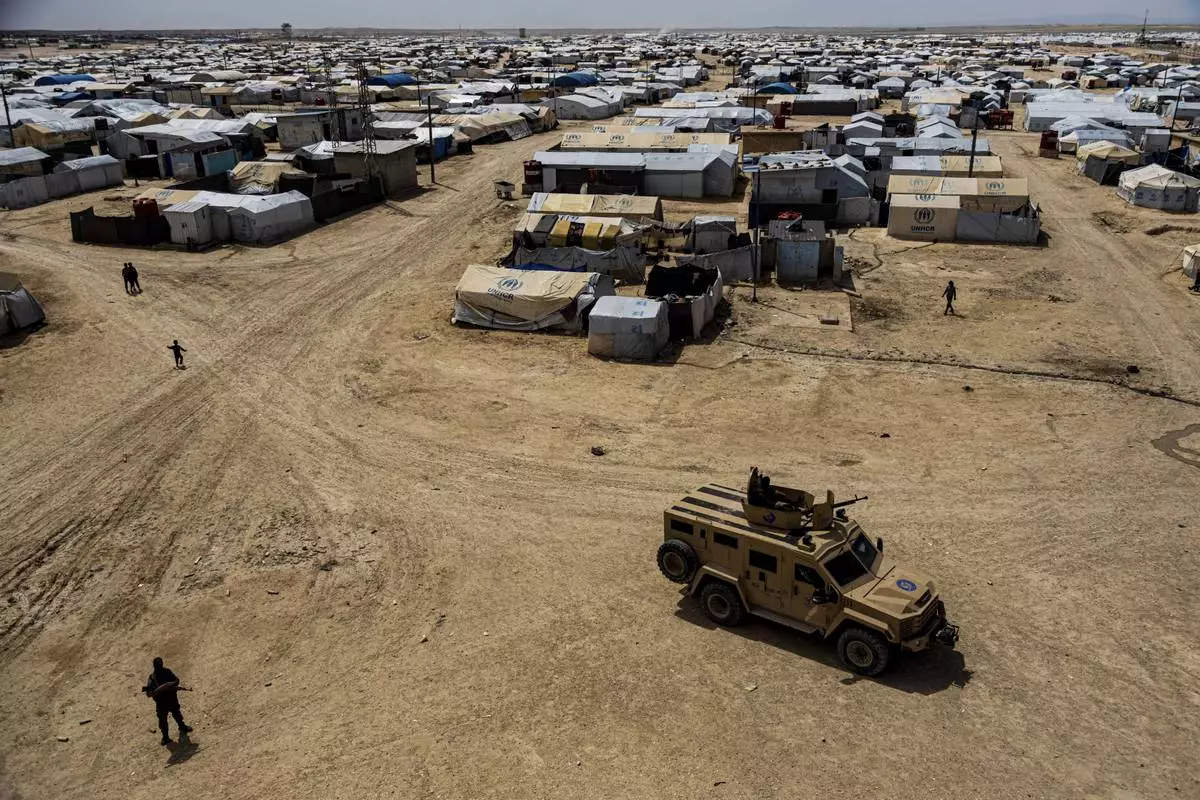
FILE - Kurdish forces patrol al-Hol camp, which houses families of members of the Islamic State group in Hasakeh province, Syria, on April 19, 2023. Amnesty International said Wednesday, April 17, 2024 it has documented widespread abuses, including torture and deprivation of medical care, in detention facilities holding thousands of suspected Islamic State members and their relatives in northeast Syria. (AP Photo/Baderkhan Ahmad, File)
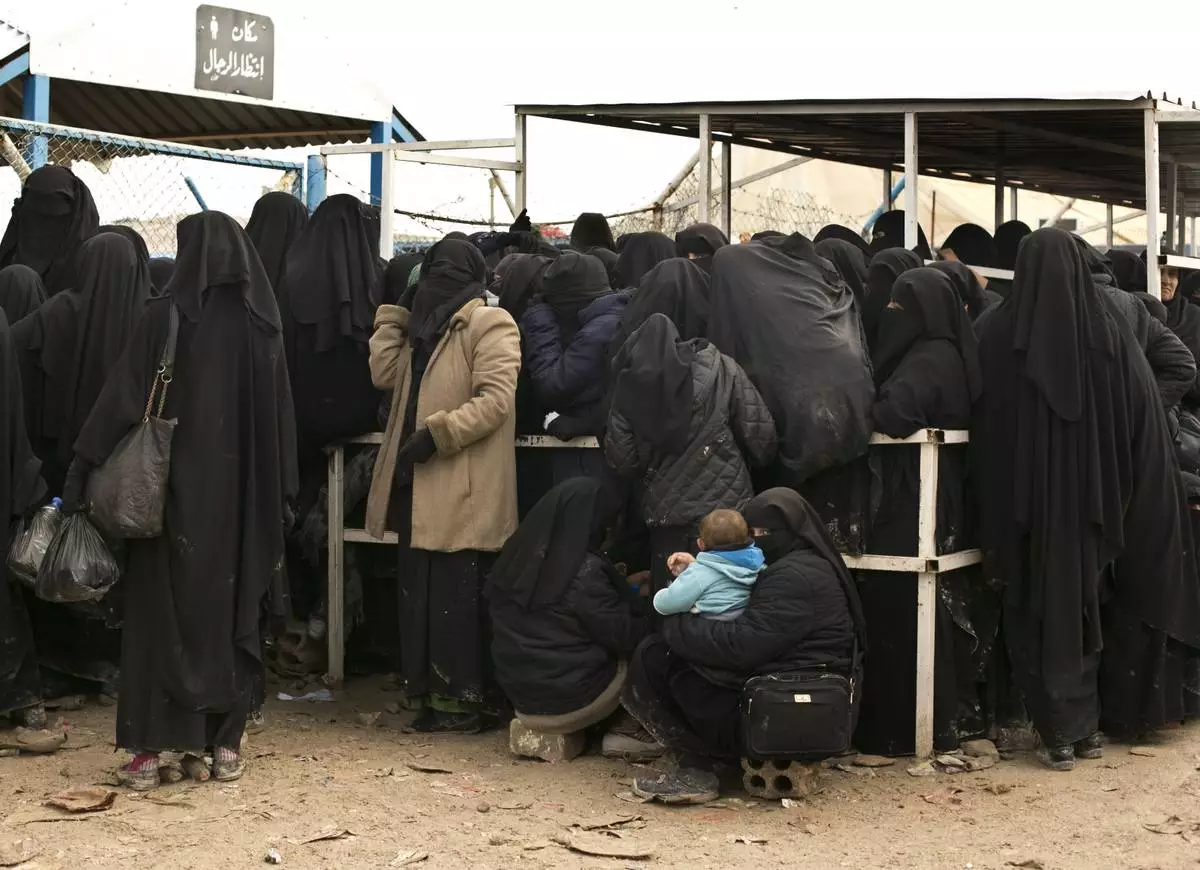
FILE - Women residents from former Islamic State-held areas in Syria line up for aid supplies at Al-Hol camp in Hassakeh province, Syria, March 31, 2019. Amnesty International said Wednesday, April 17, 2024 it has documented widespread abuses, including torture and deprivation of medical care, in detention facilities holding thousands of suspected Islamic State members and their relatives in northeast Syria. (AP Photo/Maya Alleruzzo, File)









